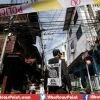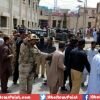Who Was Sheikh NimrAl-Nimr
Sheikh NimrAl-Nimr
The dozens people who were executed in Saudi Arabia, Sheikh Nimr al-Nmir was a one of them; who was a fierce critics of the government of Saudi Arabia. Sheikh Nimr was born in a village of Qatif, the eastern province of Saudi Arabia, in 1959 or 1960. He studied for many years in Tehran and Syria. He came back to Saudi Arabia in 1994 and his views for religious freedoms soon got him to Saudi security services’ attention. According to Al Jazeera, before his last arrest in 2012, he was taken into custody for a few days twice in 2004 and 2006.
Before 2012,there had been a massive boost in Sheik Nimr‘s popularity and he had become the national leader of Saudi Arabia.Before his arrest in Qatif, whenhe was going in his car, he was attacked with severe gunshots and meanwhile four bullets hit his leg. After this incident, protests were held in Eastern Saudi Arabia for three days in which three people died. Sheikh Nimr was in the forefront of the protests held against government of Saudi Arabia in Qatif province. It is said that besides Saudi Arabia, he was quite popular in youth of Bahrain. When anti-government protests intensified in Bahrain, Saudi troops were called in to control the situation.
During the last decade Sheikh Nimr had been arrested several times in Saudi Arabia and he was of the view that he was tortured in the custody of intelligence officers as well. In October, Saudi authorities had confirmed Sheikh Nimr family that in addition to other crimes, he will be executed for ‘foreign meddling’ in state’s matters. Sheikh Nimr had never denied the political charges against him. However, his supporters have always said that Sheikh Nimr did not encourage violence ever and always supported peaceful protest.
Once giving interview to BBC in 2011 he said he was in support of “People’s roar against authorities instead of weapons”. “Weapon of words is more powerful than bullets because authorities make money from battles of weapons” he added. He also held the rank of Ayatollah. When he went on trial in March 2013, prosecutors asked for his execution by “crucifixion”, a sentence which in Saudi Arabia includes decapitation followed by public display of the beheaded body.
At the time of trial, many human rights organizations protested that he was not being given the freedom of self-defense in the court.They were also of the view that he had still not been given access to satisfactory medical attention for the gunshot injuries he received in the course of his arrest in July 2012, something opposed by the authorities.
According to British newspaper the Guardian, during his custody in 2012, his wife Muna Jabir al-Shariyani, passed away in hospital in New York, which got him much public backing and empathy. Wiki Leaks revealed that he met US officials in 2008 and tried that he should not be considered anti-American or pro-Iranian.





























